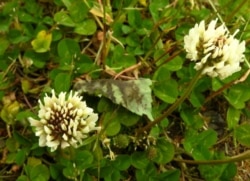This week, a group of environmental activist groups, including the World Wildlife Fund, called on European Union leaders to support re-wilding efforts.
“Re-wilding” is a conservation effort aimed at returning land to its more natural, uncultivated state. This movement is growing in popularity around the world, especially in cities and towns where short grass covers most areas, also called lawns, around houses and other buildings.
Replacing grass lawns with a diverse group of native plants that flower and fruit can help support wildlife, including bees and other insects.
American Dan Jaffe is a plant scientist with the Norcross Wildlife Sanctuary in Wales, Massachusetts. He spoke to the Associated Press about the process of re-wilding.
“The great thing about working with native plants is that these are plants that will grow in any conditions you can think of,” he said. “There is no need to bring in problem plants when there are so many other options.”
Part of the process of re-wilding means changing the way most people attend to their green spaces. For example, it is not a good idea to clean up your garden immediately at the end of the growing season. It is better to leave dead plants as they are.
“Birds who eat seeds appreciate it when you don’t deadhead flowers,” said Theresa Badurek, a horticulture agent with University of Florida Institute of Food and Agricultural Sciences. She added that less cutting of plants and grass lets pollinators get to flowers.
Badurek says fallen leaf collection should be limited too. The remains of the garden and lawn provide food and shelter for important insect life.
No area is too small, she added. “Every space we can provide for nature to blossom is valuable.”
Jaffe says it is a good idea to tell neighbors about your re-wilding project or they might misunderstand your effort as simple laziness.
“The early stages of the work can look like a mess,” he said. It can take a few years before it looks good he adds.
Jaffe also said people should only use chemicals on their green spaces if they are absolutely necessary.
“Chemicals are a tool in the toolbox,” he said. In some situations, invasive plant species require the use of herbicides. It can mean the difference between a re-wilding project succeeding or failing, Jaffee said.
I’m Pete Musto.
Pete Musto adapted this story for VOA Learning English using Associated Press report and other materials. Caty Weaver was the editor. We want to hear from you. Write to us in the Comments Section.
_______________________________________________________________
Words in This Story
uncultivated – adj. not prepared or used for growing crops or plants
diverse – adj. made up of people or things that are different from each other
option(s) - n. a choice or possibility
appreciate – v. to be thankful for something
deadhead – v. to remove dead flowers from (a plant
pollinator(s) – n. a creature that gives a plant the very fine usually yellow dust that is produced by other plants of the same kind so that the plants can produce seeds
blossom – v. to change, grow, and develop fully
laziness – n. the condition of not liking to work hard or to be active






